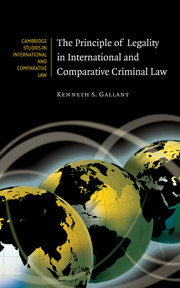Book contents
- Frontmatter
- Contents
- Explanatory Note on Spelling
- Acknowledgments
- Introduction
- 1 Legality in Criminal Law, Its Purposes, and Its Competitors
- 2 A Partial History to World War II
- 3 Nuremberg, Tokyo, and Other Postwar Cases
- 4 Modern Development of International Human Rights Law: Practice Involving Multilateral Treaties and the Universal Declaration of Human Rights
- 5 Modern Comparative Law Development: National Provisions Concerning Legality
- 6 Legality in the Modern International and Internationalized Criminal Courts and in the UN Trust Territories
- 7 Legality in Customary International Law Today
- Conclusion: The Endurance of Legality in National and International Criminal Law
- Appendix A Chart of Non-retroactivity Provisions in Criminal Law by Nations
- Appendix B Legality and Non-retroactivity Provisions as of 1946–47
- Appendix C Constitutional and Other National Provisions Implementing the Principle of Legality Today
- Bibliography
- Table of Authorities
- Index
- Afterword and Update
- CAMBRIDGE STUDIES IN INTERNATIONAL AND COMPARATIVE LAW
- References
Conclusion: The Endurance of Legality in National and International Criminal Law
Published online by Cambridge University Press: 04 July 2009
- Frontmatter
- Contents
- Explanatory Note on Spelling
- Acknowledgments
- Introduction
- 1 Legality in Criminal Law, Its Purposes, and Its Competitors
- 2 A Partial History to World War II
- 3 Nuremberg, Tokyo, and Other Postwar Cases
- 4 Modern Development of International Human Rights Law: Practice Involving Multilateral Treaties and the Universal Declaration of Human Rights
- 5 Modern Comparative Law Development: National Provisions Concerning Legality
- 6 Legality in the Modern International and Internationalized Criminal Courts and in the UN Trust Territories
- 7 Legality in Customary International Law Today
- Conclusion: The Endurance of Legality in National and International Criminal Law
- Appendix A Chart of Non-retroactivity Provisions in Criminal Law by Nations
- Appendix B Legality and Non-retroactivity Provisions as of 1946–47
- Appendix C Constitutional and Other National Provisions Implementing the Principle of Legality Today
- Bibliography
- Table of Authorities
- Index
- Afterword and Update
- CAMBRIDGE STUDIES IN INTERNATIONAL AND COMPARATIVE LAW
- References
Summary
By now, the principle of legality has come to play a central role in international practice of criminal justice that it did not play before World War II. Even in international criminal law, the rule nullum crimen, nulla poena sine lege has obtained customary international law status. Whether or not the entire rule of nullum crimen, nulla poena sine lege has become jus cogens, the principle of legality is a principle of justice whose enforcement is vital to the rule of law. No national, international, or comparative criminal jurisprudence can ignore it.
The exercise of criminal jurisdiction in violation of the rule of non-retroactivity of crimes and punishments is a violation of an international human right of the accused. The principle of legality implicates jurisdiction, as it concerns the unfairness of both retroactive definition of crimes and penalties (jurisdiction to prescribe) and retroactive application of these rules (jurisdiction to adjudicate and enforce). This is the real answer to those who argue (with some force) that issues of retroactivity have traditionally been considered separately from issues labeled “jurisdictional.” The principle also implicates the more traditionally jurisdictional issue of whether a court has been created by law.
There are those who argue that the Nazi mass murders, of the Roma as well as the Jews, made retroactive crime creation at Nuremberg acceptable. This is the force of the statement that it would have been “unjust” to let the Nazi leaders escape.
- Type
- Chapter
- Information
- Publisher: Cambridge University PressPrint publication year: 2008

